HNC Hospitality: Tech Impact on Leadership & Management Styles
VerifiedAdded on 2023/01/23
|9
|1879
|83
Report
AI Summary
This report explores the role of leadership and management in the service sector, focusing on the impact of technology on management styles. It discusses the characteristics and skills of effective managers, the importance of both hard and soft skills, and the significance of reflective practice using technology. The report differentiates between service sector change management systems, analyzes how these changes affect management and leadership styles, and critically evaluates how change management and leadership skills in the service sector have responded to technology. It further covers the role of front office and marketing managers, highlighting the importance of communication and understanding customer needs. The conclusion summarizes the key findings, emphasizing the need for continuous adaptation and innovation in the service sector.
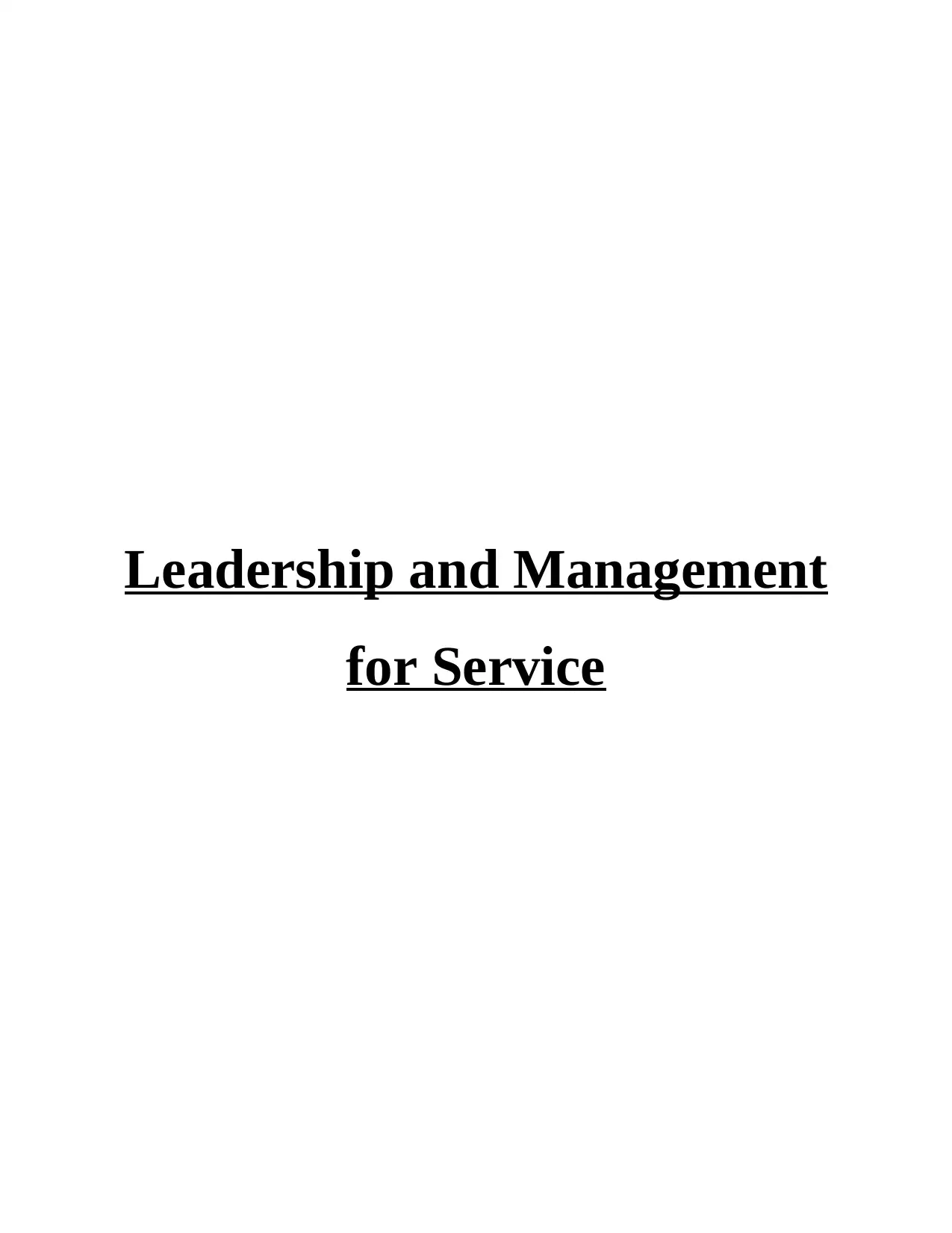
Leadership and Management
for Service
for Service
Paraphrase This Document
Need a fresh take? Get an instant paraphrase of this document with our AI Paraphraser
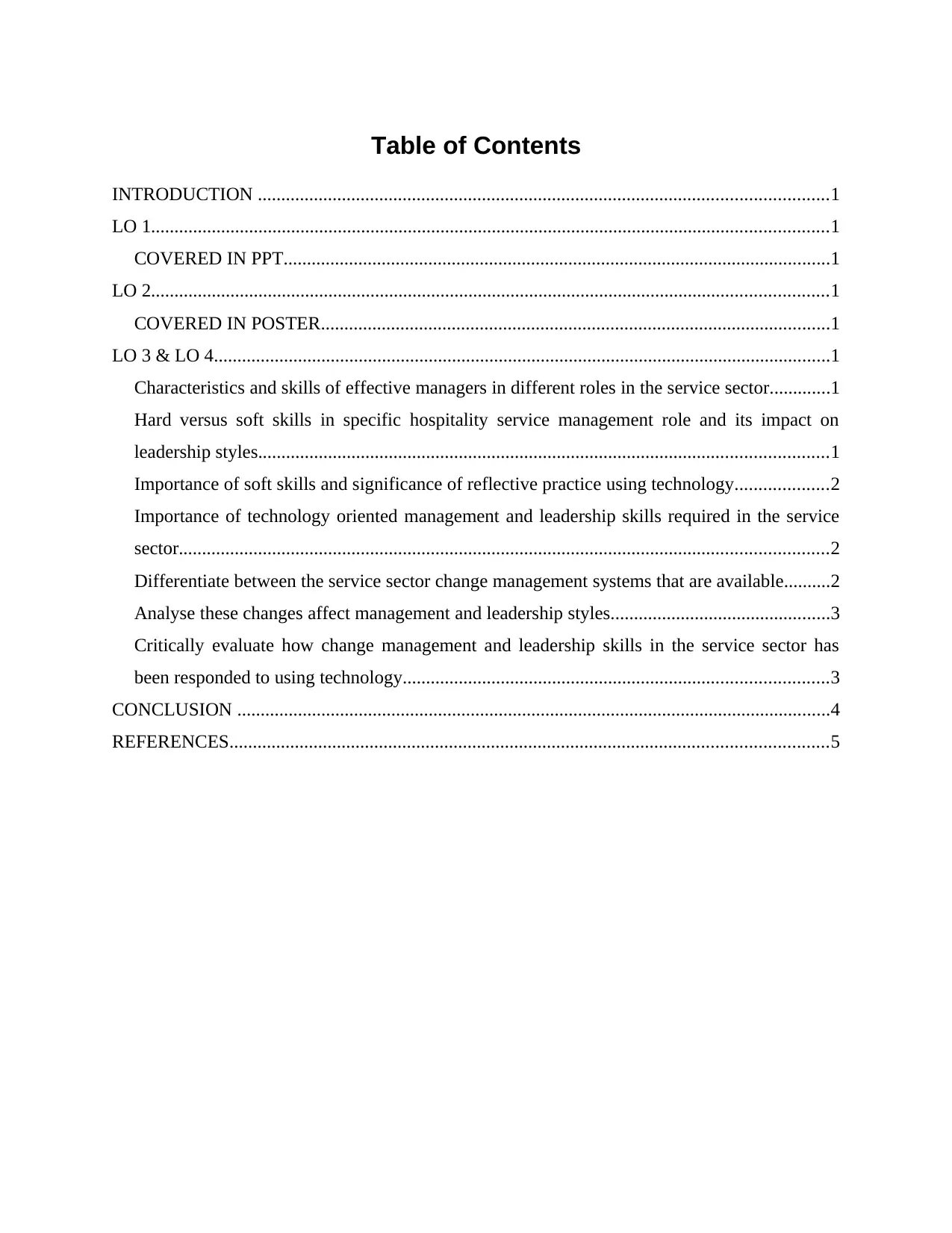
Table of Contents
INTRODUCTION ..........................................................................................................................1
LO 1.................................................................................................................................................1
COVERED IN PPT.....................................................................................................................1
LO 2.................................................................................................................................................1
COVERED IN POSTER.............................................................................................................1
LO 3 & LO 4....................................................................................................................................1
Characteristics and skills of effective managers in different roles in the service sector.............1
Hard versus soft skills in specific hospitality service management role and its impact on
leadership styles..........................................................................................................................1
Importance of soft skills and significance of reflective practice using technology....................2
Importance of technology oriented management and leadership skills required in the service
sector...........................................................................................................................................2
Differentiate between the service sector change management systems that are available..........2
Analyse these changes affect management and leadership styles...............................................3
Critically evaluate how change management and leadership skills in the service sector has
been responded to using technology...........................................................................................3
CONCLUSION ...............................................................................................................................4
REFERENCES................................................................................................................................5
INTRODUCTION ..........................................................................................................................1
LO 1.................................................................................................................................................1
COVERED IN PPT.....................................................................................................................1
LO 2.................................................................................................................................................1
COVERED IN POSTER.............................................................................................................1
LO 3 & LO 4....................................................................................................................................1
Characteristics and skills of effective managers in different roles in the service sector.............1
Hard versus soft skills in specific hospitality service management role and its impact on
leadership styles..........................................................................................................................1
Importance of soft skills and significance of reflective practice using technology....................2
Importance of technology oriented management and leadership skills required in the service
sector...........................................................................................................................................2
Differentiate between the service sector change management systems that are available..........2
Analyse these changes affect management and leadership styles...............................................3
Critically evaluate how change management and leadership skills in the service sector has
been responded to using technology...........................................................................................3
CONCLUSION ...............................................................................................................................4
REFERENCES................................................................................................................................5
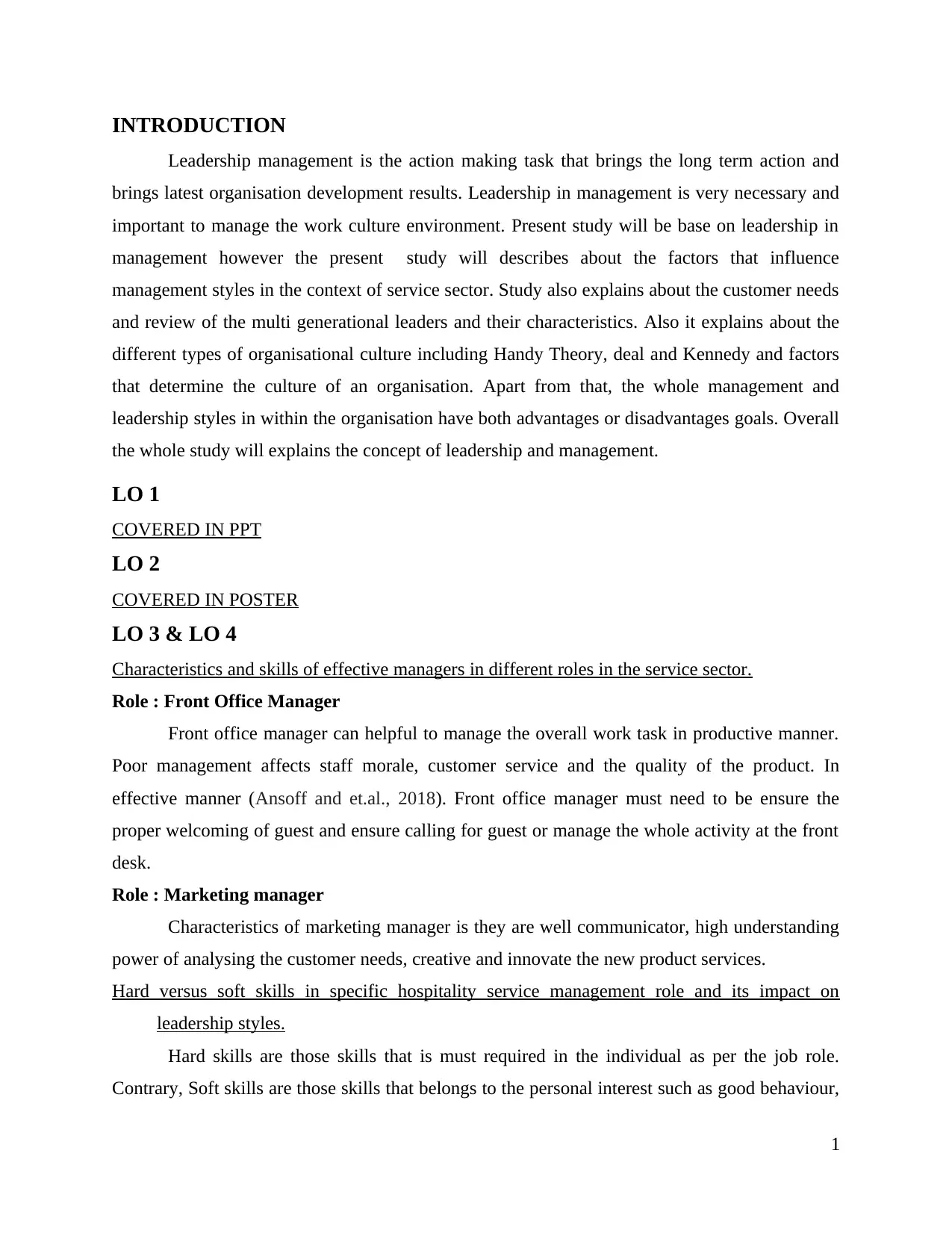
INTRODUCTION
Leadership management is the action making task that brings the long term action and
brings latest organisation development results. Leadership in management is very necessary and
important to manage the work culture environment. Present study will be base on leadership in
management however the present study will describes about the factors that influence
management styles in the context of service sector. Study also explains about the customer needs
and review of the multi generational leaders and their characteristics. Also it explains about the
different types of organisational culture including Handy Theory, deal and Kennedy and factors
that determine the culture of an organisation. Apart from that, the whole management and
leadership styles in within the organisation have both advantages or disadvantages goals. Overall
the whole study will explains the concept of leadership and management.
LO 1
COVERED IN PPT
LO 2
COVERED IN POSTER
LO 3 & LO 4
Characteristics and skills of effective managers in different roles in the service sector.
Role : Front Office Manager
Front office manager can helpful to manage the overall work task in productive manner.
Poor management affects staff morale, customer service and the quality of the product. In
effective manner (Ansoff and et.al., 2018). Front office manager must need to be ensure the
proper welcoming of guest and ensure calling for guest or manage the whole activity at the front
desk.
Role : Marketing manager
Characteristics of marketing manager is they are well communicator, high understanding
power of analysing the customer needs, creative and innovate the new product services.
Hard versus soft skills in specific hospitality service management role and its impact on
leadership styles.
Hard skills are those skills that is must required in the individual as per the job role.
Contrary, Soft skills are those skills that belongs to the personal interest such as good behaviour,
1
Leadership management is the action making task that brings the long term action and
brings latest organisation development results. Leadership in management is very necessary and
important to manage the work culture environment. Present study will be base on leadership in
management however the present study will describes about the factors that influence
management styles in the context of service sector. Study also explains about the customer needs
and review of the multi generational leaders and their characteristics. Also it explains about the
different types of organisational culture including Handy Theory, deal and Kennedy and factors
that determine the culture of an organisation. Apart from that, the whole management and
leadership styles in within the organisation have both advantages or disadvantages goals. Overall
the whole study will explains the concept of leadership and management.
LO 1
COVERED IN PPT
LO 2
COVERED IN POSTER
LO 3 & LO 4
Characteristics and skills of effective managers in different roles in the service sector.
Role : Front Office Manager
Front office manager can helpful to manage the overall work task in productive manner.
Poor management affects staff morale, customer service and the quality of the product. In
effective manner (Ansoff and et.al., 2018). Front office manager must need to be ensure the
proper welcoming of guest and ensure calling for guest or manage the whole activity at the front
desk.
Role : Marketing manager
Characteristics of marketing manager is they are well communicator, high understanding
power of analysing the customer needs, creative and innovate the new product services.
Hard versus soft skills in specific hospitality service management role and its impact on
leadership styles.
Hard skills are those skills that is must required in the individual as per the job role.
Contrary, Soft skills are those skills that belongs to the personal interest such as good behaviour,
1
⊘ This is a preview!⊘
Do you want full access?
Subscribe today to unlock all pages.

Trusted by 1+ million students worldwide
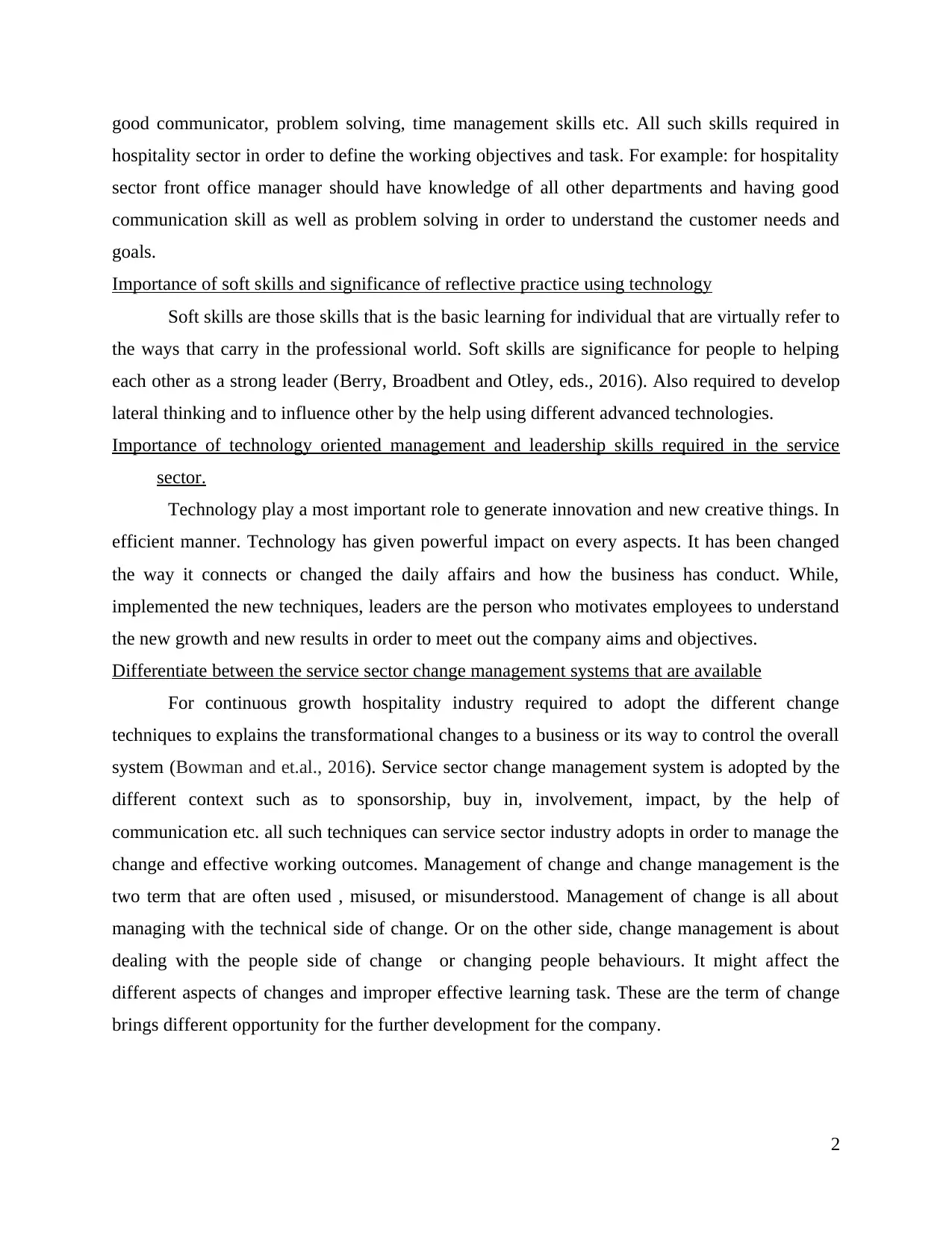
good communicator, problem solving, time management skills etc. All such skills required in
hospitality sector in order to define the working objectives and task. For example: for hospitality
sector front office manager should have knowledge of all other departments and having good
communication skill as well as problem solving in order to understand the customer needs and
goals.
Importance of soft skills and significance of reflective practice using technology
Soft skills are those skills that is the basic learning for individual that are virtually refer to
the ways that carry in the professional world. Soft skills are significance for people to helping
each other as a strong leader (Berry, Broadbent and Otley, eds., 2016). Also required to develop
lateral thinking and to influence other by the help using different advanced technologies.
Importance of technology oriented management and leadership skills required in the service
sector.
Technology play a most important role to generate innovation and new creative things. In
efficient manner. Technology has given powerful impact on every aspects. It has been changed
the way it connects or changed the daily affairs and how the business has conduct. While,
implemented the new techniques, leaders are the person who motivates employees to understand
the new growth and new results in order to meet out the company aims and objectives.
Differentiate between the service sector change management systems that are available
For continuous growth hospitality industry required to adopt the different change
techniques to explains the transformational changes to a business or its way to control the overall
system (Bowman and et.al., 2016). Service sector change management system is adopted by the
different context such as to sponsorship, buy in, involvement, impact, by the help of
communication etc. all such techniques can service sector industry adopts in order to manage the
change and effective working outcomes. Management of change and change management is the
two term that are often used , misused, or misunderstood. Management of change is all about
managing with the technical side of change. Or on the other side, change management is about
dealing with the people side of change or changing people behaviours. It might affect the
different aspects of changes and improper effective learning task. These are the term of change
brings different opportunity for the further development for the company.
2
hospitality sector in order to define the working objectives and task. For example: for hospitality
sector front office manager should have knowledge of all other departments and having good
communication skill as well as problem solving in order to understand the customer needs and
goals.
Importance of soft skills and significance of reflective practice using technology
Soft skills are those skills that is the basic learning for individual that are virtually refer to
the ways that carry in the professional world. Soft skills are significance for people to helping
each other as a strong leader (Berry, Broadbent and Otley, eds., 2016). Also required to develop
lateral thinking and to influence other by the help using different advanced technologies.
Importance of technology oriented management and leadership skills required in the service
sector.
Technology play a most important role to generate innovation and new creative things. In
efficient manner. Technology has given powerful impact on every aspects. It has been changed
the way it connects or changed the daily affairs and how the business has conduct. While,
implemented the new techniques, leaders are the person who motivates employees to understand
the new growth and new results in order to meet out the company aims and objectives.
Differentiate between the service sector change management systems that are available
For continuous growth hospitality industry required to adopt the different change
techniques to explains the transformational changes to a business or its way to control the overall
system (Bowman and et.al., 2016). Service sector change management system is adopted by the
different context such as to sponsorship, buy in, involvement, impact, by the help of
communication etc. all such techniques can service sector industry adopts in order to manage the
change and effective working outcomes. Management of change and change management is the
two term that are often used , misused, or misunderstood. Management of change is all about
managing with the technical side of change. Or on the other side, change management is about
dealing with the people side of change or changing people behaviours. It might affect the
different aspects of changes and improper effective learning task. These are the term of change
brings different opportunity for the further development for the company.
2
Paraphrase This Document
Need a fresh take? Get an instant paraphrase of this document with our AI Paraphraser
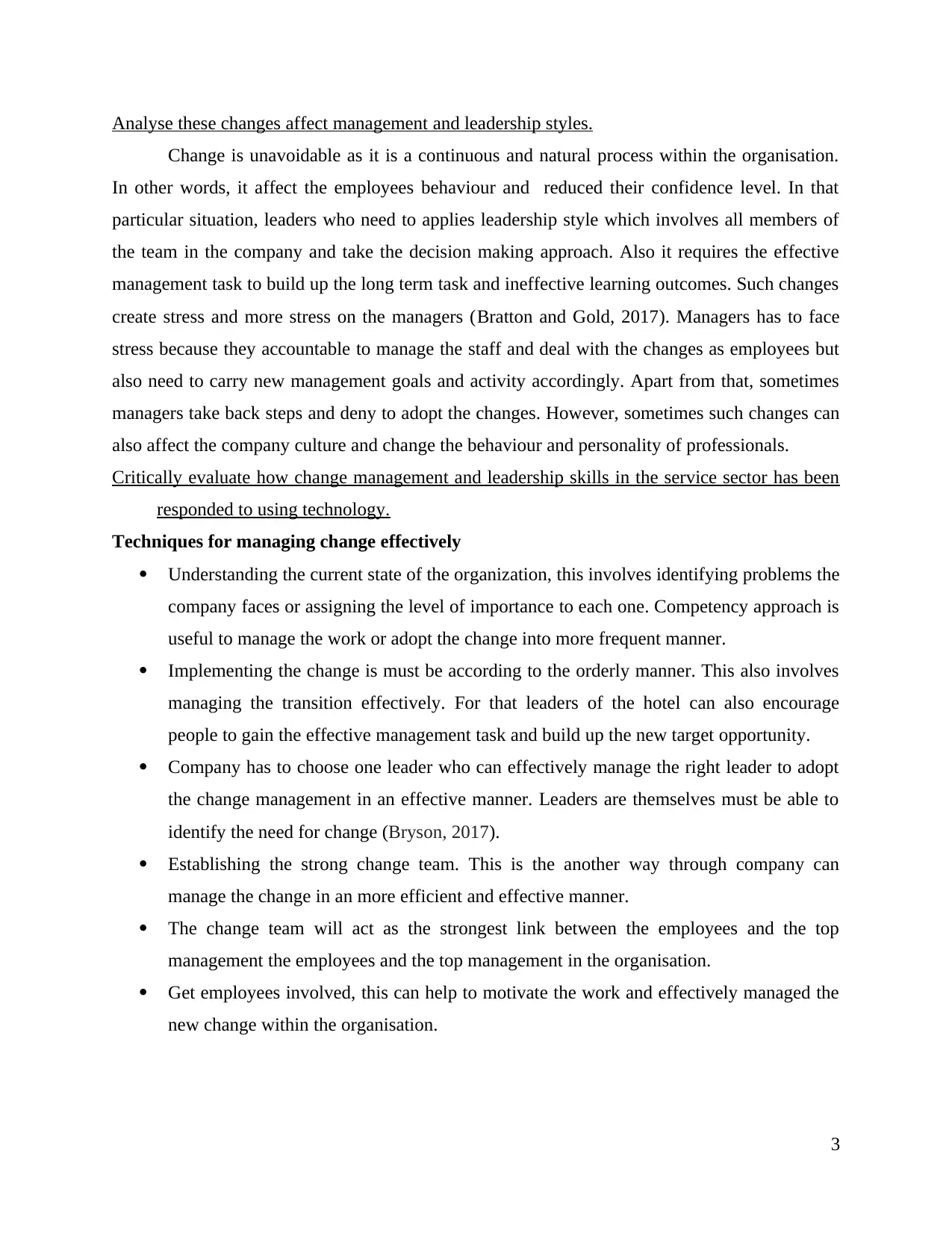
Analyse these changes affect management and leadership styles.
Change is unavoidable as it is a continuous and natural process within the organisation.
In other words, it affect the employees behaviour and reduced their confidence level. In that
particular situation, leaders who need to applies leadership style which involves all members of
the team in the company and take the decision making approach. Also it requires the effective
management task to build up the long term task and ineffective learning outcomes. Such changes
create stress and more stress on the managers (Bratton and Gold, 2017). Managers has to face
stress because they accountable to manage the staff and deal with the changes as employees but
also need to carry new management goals and activity accordingly. Apart from that, sometimes
managers take back steps and deny to adopt the changes. However, sometimes such changes can
also affect the company culture and change the behaviour and personality of professionals.
Critically evaluate how change management and leadership skills in the service sector has been
responded to using technology.
Techniques for managing change effectively
Understanding the current state of the organization, this involves identifying problems the
company faces or assigning the level of importance to each one. Competency approach is
useful to manage the work or adopt the change into more frequent manner.
Implementing the change is must be according to the orderly manner. This also involves
managing the transition effectively. For that leaders of the hotel can also encourage
people to gain the effective management task and build up the new target opportunity.
Company has to choose one leader who can effectively manage the right leader to adopt
the change management in an effective manner. Leaders are themselves must be able to
identify the need for change (Bryson, 2017).
Establishing the strong change team. This is the another way through company can
manage the change in an more efficient and effective manner.
The change team will act as the strongest link between the employees and the top
management the employees and the top management in the organisation.
Get employees involved, this can help to motivate the work and effectively managed the
new change within the organisation.
3
Change is unavoidable as it is a continuous and natural process within the organisation.
In other words, it affect the employees behaviour and reduced their confidence level. In that
particular situation, leaders who need to applies leadership style which involves all members of
the team in the company and take the decision making approach. Also it requires the effective
management task to build up the long term task and ineffective learning outcomes. Such changes
create stress and more stress on the managers (Bratton and Gold, 2017). Managers has to face
stress because they accountable to manage the staff and deal with the changes as employees but
also need to carry new management goals and activity accordingly. Apart from that, sometimes
managers take back steps and deny to adopt the changes. However, sometimes such changes can
also affect the company culture and change the behaviour and personality of professionals.
Critically evaluate how change management and leadership skills in the service sector has been
responded to using technology.
Techniques for managing change effectively
Understanding the current state of the organization, this involves identifying problems the
company faces or assigning the level of importance to each one. Competency approach is
useful to manage the work or adopt the change into more frequent manner.
Implementing the change is must be according to the orderly manner. This also involves
managing the transition effectively. For that leaders of the hotel can also encourage
people to gain the effective management task and build up the new target opportunity.
Company has to choose one leader who can effectively manage the right leader to adopt
the change management in an effective manner. Leaders are themselves must be able to
identify the need for change (Bryson, 2017).
Establishing the strong change team. This is the another way through company can
manage the change in an more efficient and effective manner.
The change team will act as the strongest link between the employees and the top
management the employees and the top management in the organisation.
Get employees involved, this can help to motivate the work and effectively managed the
new change within the organisation.
3
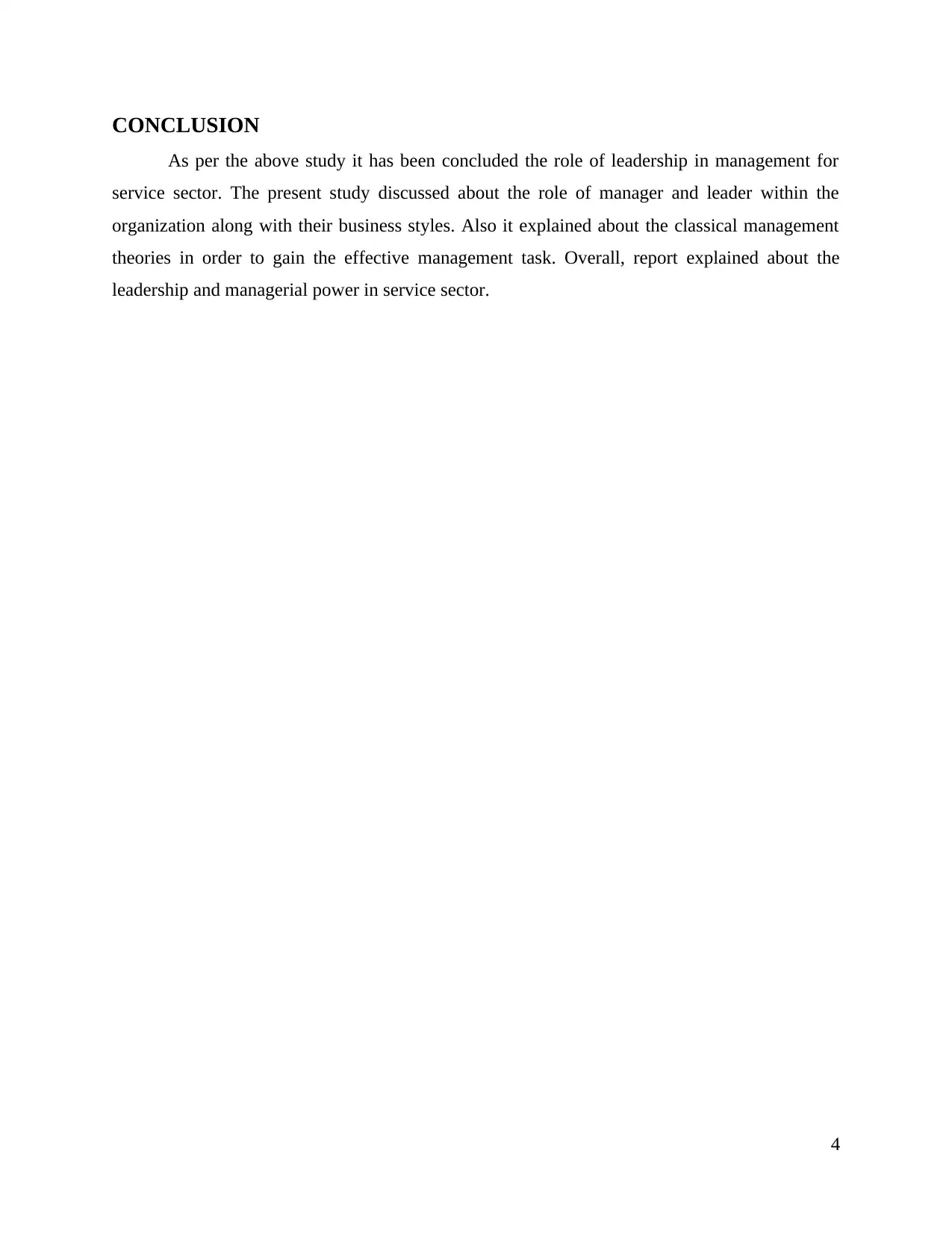
CONCLUSION
As per the above study it has been concluded the role of leadership in management for
service sector. The present study discussed about the role of manager and leader within the
organization along with their business styles. Also it explained about the classical management
theories in order to gain the effective management task. Overall, report explained about the
leadership and managerial power in service sector.
4
As per the above study it has been concluded the role of leadership in management for
service sector. The present study discussed about the role of manager and leader within the
organization along with their business styles. Also it explained about the classical management
theories in order to gain the effective management task. Overall, report explained about the
leadership and managerial power in service sector.
4
⊘ This is a preview!⊘
Do you want full access?
Subscribe today to unlock all pages.

Trusted by 1+ million students worldwide
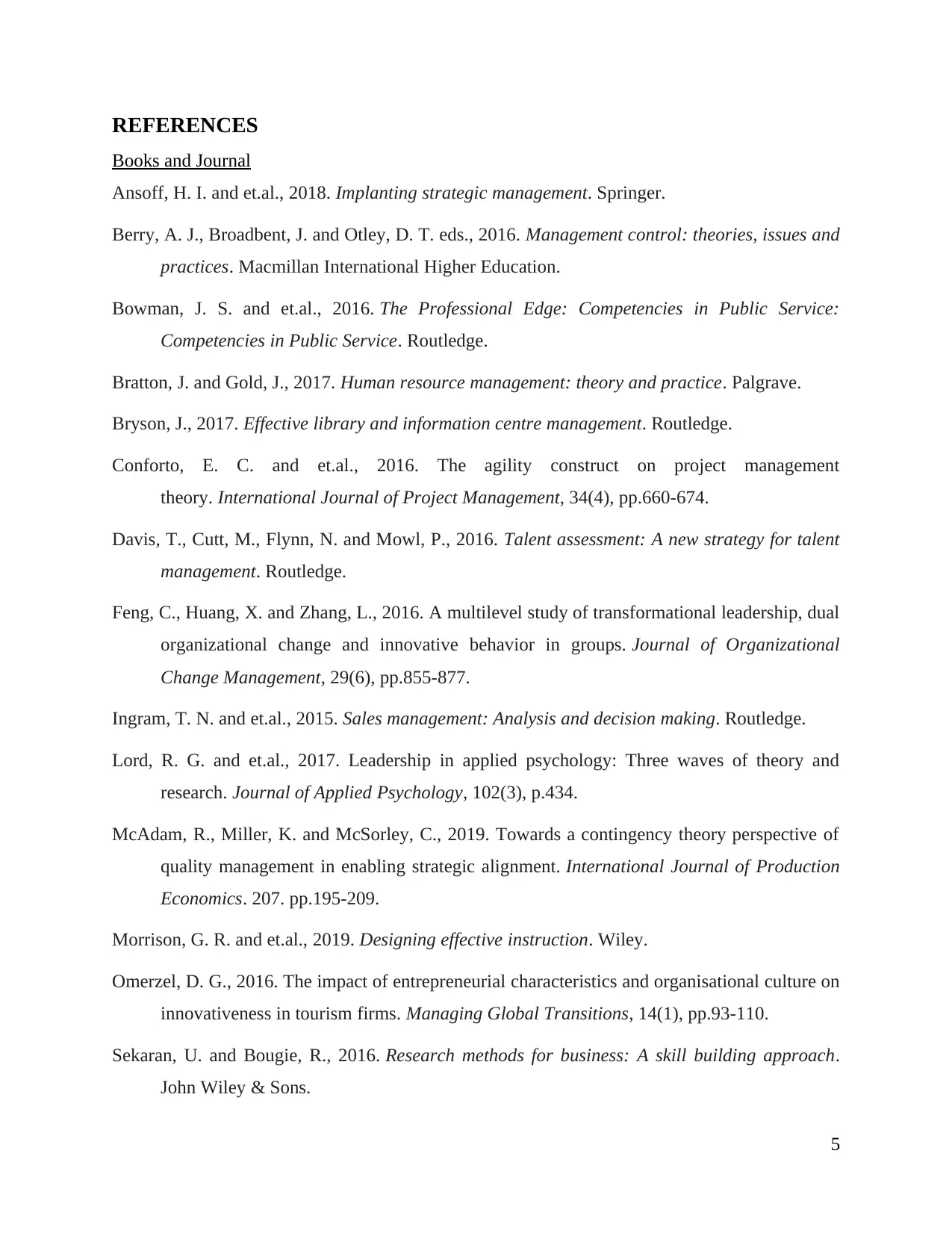
REFERENCES
Books and Journal
Ansoff, H. I. and et.al., 2018. Implanting strategic management. Springer.
Berry, A. J., Broadbent, J. and Otley, D. T. eds., 2016. Management control: theories, issues and
practices. Macmillan International Higher Education.
Bowman, J. S. and et.al., 2016. The Professional Edge: Competencies in Public Service:
Competencies in Public Service. Routledge.
Bratton, J. and Gold, J., 2017. Human resource management: theory and practice. Palgrave.
Bryson, J., 2017. Effective library and information centre management. Routledge.
Conforto, E. C. and et.al., 2016. The agility construct on project management
theory. International Journal of Project Management, 34(4), pp.660-674.
Davis, T., Cutt, M., Flynn, N. and Mowl, P., 2016. Talent assessment: A new strategy for talent
management. Routledge.
Feng, C., Huang, X. and Zhang, L., 2016. A multilevel study of transformational leadership, dual
organizational change and innovative behavior in groups. Journal of Organizational
Change Management, 29(6), pp.855-877.
Ingram, T. N. and et.al., 2015. Sales management: Analysis and decision making. Routledge.
Lord, R. G. and et.al., 2017. Leadership in applied psychology: Three waves of theory and
research. Journal of Applied Psychology, 102(3), p.434.
McAdam, R., Miller, K. and McSorley, C., 2019. Towards a contingency theory perspective of
quality management in enabling strategic alignment. International Journal of Production
Economics. 207. pp.195-209.
Morrison, G. R. and et.al., 2019. Designing effective instruction. Wiley.
Omerzel, D. G., 2016. The impact of entrepreneurial characteristics and organisational culture on
innovativeness in tourism firms. Managing Global Transitions, 14(1), pp.93-110.
Sekaran, U. and Bougie, R., 2016. Research methods for business: A skill building approach.
John Wiley & Sons.
5
Books and Journal
Ansoff, H. I. and et.al., 2018. Implanting strategic management. Springer.
Berry, A. J., Broadbent, J. and Otley, D. T. eds., 2016. Management control: theories, issues and
practices. Macmillan International Higher Education.
Bowman, J. S. and et.al., 2016. The Professional Edge: Competencies in Public Service:
Competencies in Public Service. Routledge.
Bratton, J. and Gold, J., 2017. Human resource management: theory and practice. Palgrave.
Bryson, J., 2017. Effective library and information centre management. Routledge.
Conforto, E. C. and et.al., 2016. The agility construct on project management
theory. International Journal of Project Management, 34(4), pp.660-674.
Davis, T., Cutt, M., Flynn, N. and Mowl, P., 2016. Talent assessment: A new strategy for talent
management. Routledge.
Feng, C., Huang, X. and Zhang, L., 2016. A multilevel study of transformational leadership, dual
organizational change and innovative behavior in groups. Journal of Organizational
Change Management, 29(6), pp.855-877.
Ingram, T. N. and et.al., 2015. Sales management: Analysis and decision making. Routledge.
Lord, R. G. and et.al., 2017. Leadership in applied psychology: Three waves of theory and
research. Journal of Applied Psychology, 102(3), p.434.
McAdam, R., Miller, K. and McSorley, C., 2019. Towards a contingency theory perspective of
quality management in enabling strategic alignment. International Journal of Production
Economics. 207. pp.195-209.
Morrison, G. R. and et.al., 2019. Designing effective instruction. Wiley.
Omerzel, D. G., 2016. The impact of entrepreneurial characteristics and organisational culture on
innovativeness in tourism firms. Managing Global Transitions, 14(1), pp.93-110.
Sekaran, U. and Bougie, R., 2016. Research methods for business: A skill building approach.
John Wiley & Sons.
5
Paraphrase This Document
Need a fresh take? Get an instant paraphrase of this document with our AI Paraphraser
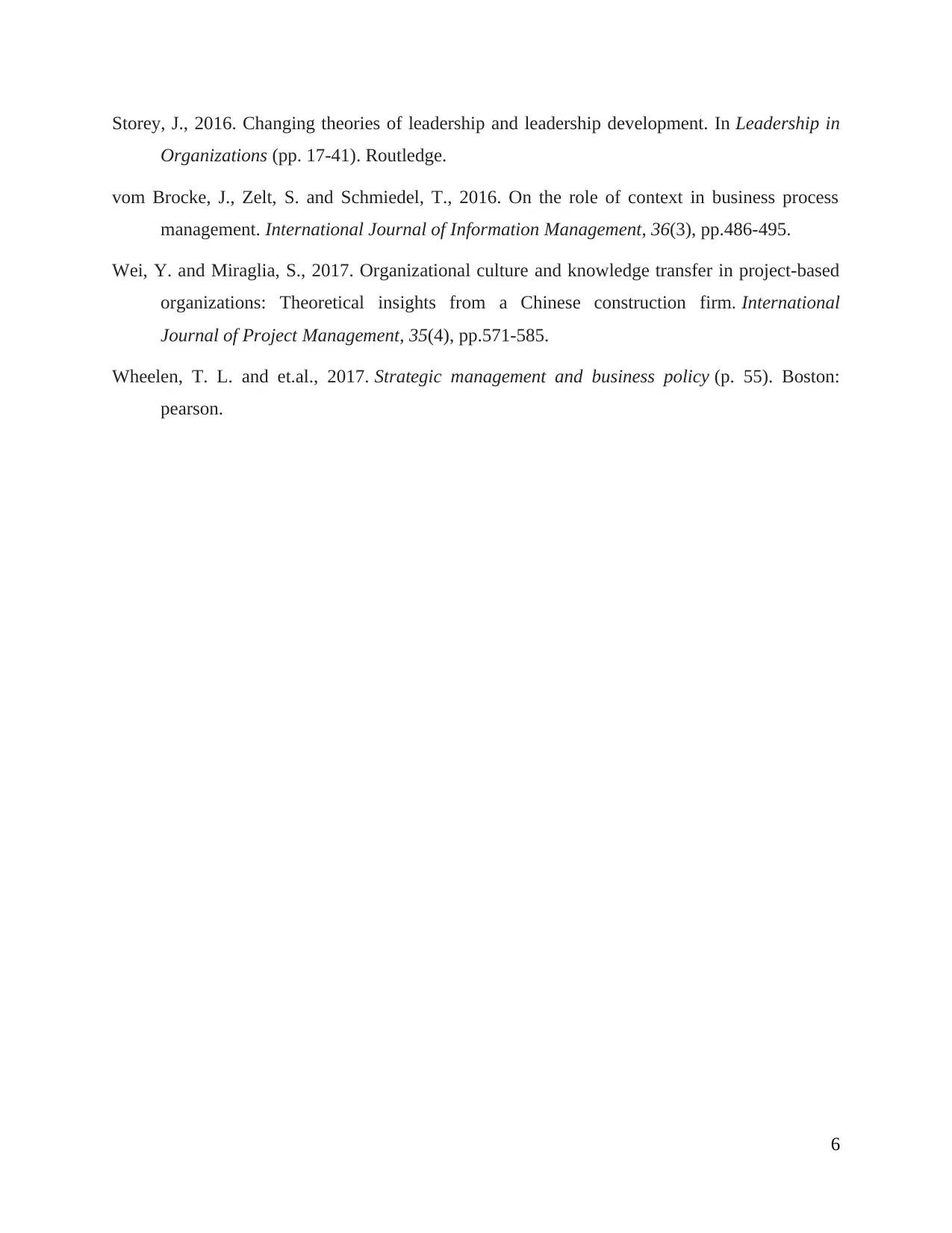
Storey, J., 2016. Changing theories of leadership and leadership development. In Leadership in
Organizations (pp. 17-41). Routledge.
vom Brocke, J., Zelt, S. and Schmiedel, T., 2016. On the role of context in business process
management. International Journal of Information Management, 36(3), pp.486-495.
Wei, Y. and Miraglia, S., 2017. Organizational culture and knowledge transfer in project-based
organizations: Theoretical insights from a Chinese construction firm. International
Journal of Project Management, 35(4), pp.571-585.
Wheelen, T. L. and et.al., 2017. Strategic management and business policy (p. 55). Boston:
pearson.
6
Organizations (pp. 17-41). Routledge.
vom Brocke, J., Zelt, S. and Schmiedel, T., 2016. On the role of context in business process
management. International Journal of Information Management, 36(3), pp.486-495.
Wei, Y. and Miraglia, S., 2017. Organizational culture and knowledge transfer in project-based
organizations: Theoretical insights from a Chinese construction firm. International
Journal of Project Management, 35(4), pp.571-585.
Wheelen, T. L. and et.al., 2017. Strategic management and business policy (p. 55). Boston:
pearson.
6

7
⊘ This is a preview!⊘
Do you want full access?
Subscribe today to unlock all pages.

Trusted by 1+ million students worldwide
1 out of 9
Related Documents
Your All-in-One AI-Powered Toolkit for Academic Success.
+13062052269
info@desklib.com
Available 24*7 on WhatsApp / Email
![[object Object]](/_next/static/media/star-bottom.7253800d.svg)
Unlock your academic potential
Copyright © 2020–2026 A2Z Services. All Rights Reserved. Developed and managed by ZUCOL.





